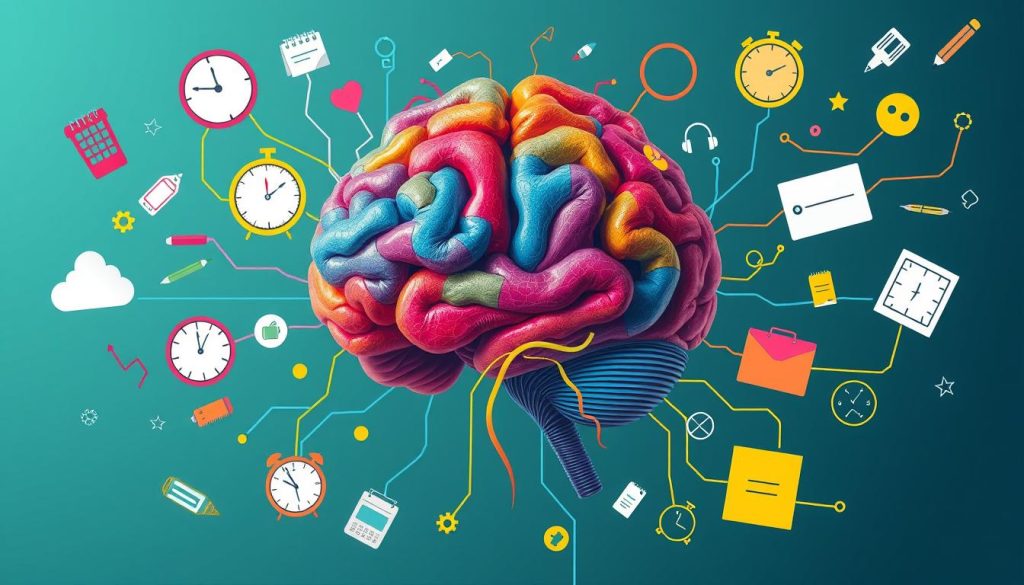The talk about ADHD awareness often centers on one big question: Is Attention-Deficit/Hyperactivity Disorder (ADHD) a mental health issue? The American Psychiatric Association says yes, ADHD is a chronic condition. It’s marked by patterns of not paying attention and/or being too active and impulsive.
ADHD can really affect school, work, and personal relationships. This is why it’s seen as part of mental health education.
Some people doubt ADHD’s existence, but the World Health Organization and others agree it’s real. Still, many struggle to understand ADHD’s complexity. They wonder about its real effects on people and its role in mental health.
We’re going to explore ADHD with empathy and knowledge. We’ll look into its many sides.
Want to learn more about ADHD? Check out the American Psychiatric Association.
Key Takeaways
- ADHD is officially classified as a mental health condition by authoritative bodies.
- Understanding the nuances of ADHD is crucial for fostering empathy and comprehension.
- Recognizing the impacts of ADHD on various life aspects enhances support systems.
- Addressing the controversy around ADHD requires a blend of medical evidence and societal education.
- Comprehensive mental health education helps dispel myths surrounding ADHD.
What is ADHD?
Attention Deficit Hyperactivity Disorder (ADHD) is a complex condition that affects millions worldwide. It shows through various symptoms and can impact many areas of life. Knowing about ADHD’s overview, characteristics, and types helps understand its challenges.
Definition and Overview
ADHD is marked by inattention, hyperactivity, and impulsivity. It’s more common in children but can also affect adults. It’s a common condition that shows differently in everyone.
Common Symptoms
Spotting ADHD symptoms early is key. Signs include trouble focusing, too much activity, and acting on impulse. These must be seen in many places, like home and school, to be diagnosed.
Types of ADHD
ADHD is divided into three main types:
- Predominantly Inattentive Presentation.
- Predominantly Hyperactive-Impulsive Presentation.
- Combined Presentation.
Each type has its own set of symptoms. This helps in creating treatments that fit each person’s needs.
| Type | Key Characteristics | Common Challenges |
|---|---|---|
| Inattentive | Difficulty sustaining attention, prone to forgetfulness | Following through on tasks, keeping organized |
| Hyperactive-Impulsive | Excessive energy, impulsive decisions | Sitting still, waiting turns in conversations |
| Combined | Mix of inattentive and hyperactive-impulsive symptoms | Meeting expectations in multiple types of settings |
How ADHD is Diagnosed
Finding out if someone has ADHD is a detailed process. It follows strict ADHD diagnosis process rules. This makes sure the diagnosis fits each person’s needs perfectly.
Diagnostic Criteria
The first step in diagnosing ADHD is checking symptoms against the DSM-5. People must show symptoms that really affect their daily life. These symptoms should be more noticeable than in others at the same age.
Role of Healthcare Professionals
Doctors and psychologists are key in diagnosing ADHD. They do interviews and behavioral checks. They also talk to family and teachers to understand the person’s behavior better.
Assessment Tools
Many tools help diagnose ADHD accurately. These include behavior scales, interviews, and tests. The right tool depends on the person’s symptoms and situation, making the diagnosis personal.
| Assessment Tool | Purpose | Commonly Used For |
|---|---|---|
| Behavior Rating Scales | Evaluate the frequency of behavior | Identifying behavior patterns in different environments |
| Conner’s Comprehensive Behavior Rating Scales | Assess a wide spectrum of behaviors and emotions | Children and adolescents |
| Adult ADHD Self-Report Scale (ASRS) | Self-assessment of ADHD symptoms | Adult diagnosis |
ADHD and Mental Health
The ADHD mental health debate is about whether Attention Deficit Hyperactivity Disorder is a mental health issue. More research and experts agree it is. This part talks about how ADHD is linked to other mental health problems. It also looks at the big ADHD daily challenges people face.
Is ADHD Truly a Mental Health Condition?
ADHD is seen as a mental health disorder by many doctors. It’s listed in the Diagnostic and Statistical Manual of Mental Disorders (DSM-5). This helps people get the right treatment and support.
Co-occurring Disorders
ADHD usually comes with other mental health issues. This makes it harder to diagnose and treat. Conditions like anxiety, depression, and bipolar disorder can make life even tougher.
Impact on Daily Life
ADHD makes everyday life hard. It affects school, friends, and work. People with ADHD often feel stressed and frustrated. They need help and support to manage these challenges.
| ADHD Challenge | Impact on Life |
|---|---|
| Time Management | Struggles with punctuality and task completion |
| Impulse Control | Difficulty in controlling reactions, potentially harming social interactions |
| Focus and Attention | Consistent challenges in maintaining attention, affecting productivity and learning |
| Emotional Regulation | Heightened emotional responses leading to stress and anxiety |
Treatment Options for ADHD
Managing ADHD requires a mix of different treatments. It’s important to tailor these treatments to each person’s needs. This way, they work better. The main treatments include behavioral therapy, medications, and lifestyle changes. These are key to managing ADHD.
Behavioral Therapy
Behavioral strategies are crucial in treating ADHD. Cognitive-behavior therapy (CBT) helps people manage their behavior. It teaches them to cope better with daily tasks and social situations.
Therapists work with individuals, parents, and teachers. This ensures that strategies are used everywhere. It makes treatment more effective.
Medications
Medications are a big part of ADHD treatment. Most people find relief with stimulants like amphetamines and methylphenidate. These help about 70% of adults and 70-80% of children.
There are also non-stimulant options like atomoxetine. These work differently and can be a good choice for some. A doctor will help find the best medicine for you.
Lifestyle Changes
Lifestyle changes are also important. Regular exercise, a routine, healthy food, and enough sleep help a lot. These changes can reduce symptoms and improve overall health.
Adding positive habits to your life helps you deal with daily challenges better. It’s a big part of managing ADHD.
| Treatment Type | Description | Impact |
|---|---|---|
| Behavioral Therapy | Includes techniques like CBT to improve self-regulation and coping mechanisms. | High impact on daily functioning and social interactions. |
| Medications | Stimulants and non-stimulants prescribed based on individual needs. | Primary method for symptom control in most individuals. |
| Lifestyle Changes | Emphasizes physical health, routine, and diet modifications. | Supports overall well-being and complements other treatments. |
Creating a treatment plan that fits each person’s needs is key. It makes therapy more effective. This approach helps manage ADHD better.
ADHD Across Different Age Groups
Attention-Deficit/Hyperactivity Disorder (ADHD) shows up in different ways at different ages. It affects school, social life, and work. Knowing how ADHD in children, ADHD in youth, and adult ADHD work can help manage it better.
Children and ADHD
ADHD in kids is often seen in school. They might have trouble focusing, be too active, or act impulsively. Early help is key and can include therapy, school support, and medicine. Parents and teachers are very important in helping kids stay on track.
Adolescents and ADHD
When kids with ADHD grow up, their symptoms can change. ADHD in teens can make it hard to manage time, stay organized, and get along with others. Teens may also struggle with their feelings and self-worth. It’s important for teens and their caregivers to talk openly to handle these tough years.
Adults with ADHD
ADHD in adults is often missed or misdiagnosed. It can mess with work, personal life, and relationships. Adults with ADHD might struggle with time, organization, and setting goals. Getting the right diagnosis and treatment is crucial. Work adjustments and therapy can help manage symptoms.
For more information on ADHD, check out this resource: National Institute of Mental Health.
Myths and Misconceptions About ADHD
It’s important to tackle the myths and misconceptions about ADHD. Debunking ADHD myths helps reduce stigma and increases understanding. It shows that ADHD is a real condition with its own set of challenges.
ADHD misconceptions have created a false image. They say ADHD isn’t real or only affects kids. These myths make life harder for those with ADHD in school, work, and social settings.
Myth
We will look at myths like ‘ADHD is not real’ and ‘ADHD only affects children’. We’ll provide facts to counter these myths. Our goal is to share accurate information and clear up these misconceptions.
1: ADHD Isn’t Real
Many people doubt if Attention-Deficit/Hyperactivity Disorder (ADHD) is real. But, a lot of scientific research backs up its existence. This makes ADHD a recognized neurodevelopmental disorder in the medical field.
For those who have ADHD, it’s a part of their everyday life. They face many challenges every day. The ADHD evidence includes studies on the brain, genetics, and doctor’s evaluations. This evidence proves that ADHD is a real condition.
When we look closely at ADHD, we see that saying “ADHD isn’t real” is not true. This helps us understand ADHD better.
Key Takeaways
- ADHD is underpinned by substantial scientific research validating its existence.
- Recognition of ADHD by the medical community is broad and supported by clinical evidence.
- Real-life experiences of individuals affirm the daily impact of ADHD.
- Neuroimaging and genetic studies provide tangible evidence of ADHD’s neurodevelopmental basis.
- Deconstructing myths is essential for the accurate understanding and support of those affected by ADHD.
2: Only Children Have ADHD
The idea that ADHD only affects kids is a myth that needs to be debunked. The truth is, adult ADHD awareness is just as important as knowing about it in children. ADHD doesn’t disappear as people get older; it stays with many individuals, often unnoticed. By understanding and acknowledging lifelong ADHD, we can better reflect its impact on many lives over the years.
As we grow in our understanding of ADHD, it’s clear that seeing it as a lifelong condition is key. ADHD symptoms can change over time. What might have been obvious hyperactivity in kids might turn into disorganization or time management issues in adults. Adult ADHD is just as real, valid, and impactful, and it deserves more attention in our talks about mental health and wellness.

Key Takeaways
- ADHD is a lifelong condition, not bound by age.
- The importance of adult ADHD awareness is rising as misconceptions are dispelled.
- Adults with ADHD may experience different symptoms than children with the disorder.
- Recognition of ADHD across the lifespan can lead to better resources and support for adults.
- Understanding the evolution of ADHD from childhood into adulthood is crucial for adequate care.
- Supporting adults with ADHD involves acknowledging the condition’s diverse impacts on daily living and long-term health.
3: ADHD is Caused by Poor Parenting
There’s a big need to clear up ADHD misconceptions. One big myth is that ADHD comes from poor parenting. This part of the article aims to explain the truth about understanding ADHD causes. While good parenting is key, ADHD is mainly caused by genetics and brain issues.
It’s easy to see why people think this, looking for reasons or blame for tough behaviors. But studies show ADHD is much more complex than just home life. We aim to not just debunk myths but also help parents support kids with ADHD well, without guilt.
Key Takeaways
- ADHD is a complex disorder with a strong genetic link, not just from parenting.
- Knowing the real causes of ADHD helps clear parents’ guilt.
- Research shows ADHD is linked to brain and genetic factors.
- Helping parents cope is more important than changing ADHD itself.
- Challenging ADHD myths, like blaming parents, helps families get support.
The Role of Genetics in ADHD
The link between genetics and Attention Deficit Hyperactivity Disorder (ADHD) is a key area in ADHD research. Studies show a strong ADHD genetic link, giving us important insights. This part looks at the genetic factors of ADHD and how environment affects these genes.
Hereditary Factors
ADHD often runs in families, showing a strong genetic link. Research shows that people with a family history of ADHD are more likely to have it. Twin and adoption studies confirm that genes play a big role, with genetics being responsible for 70-80% of ADHD risk.
Identifying specific genetic markers involved in brain development supports the ADHD genetic link. This shows how complex genetic transmissions are.
Environmental Influences
Genetics are important, but environment also plays a big role in ADHD, acting as key ADHD risk factors. Prenatal exposures, like maternal smoking or alcohol, increase ADHD risk in children. Postnatal factors, like lead exposure in childhood, also link to ADHD symptoms.
These environmental factors, combined with genetic predispositions, make ADHD complex. They show that genes and environment work together to shape ADHD.
Coping Strategies for Individuals with ADHD
Managing ADHD requires different strategies for various needs. From structured time management to mindfulness, support is diverse. It greatly improves life quality.
Time Management Techniques
People with ADHD often struggle with organization and time. Using planners and digital reminders helps manage time better. Breaking tasks into smaller steps also helps avoid feeling overwhelmed and achieve daily goals.
Mindfulness and Relaxation
Mindfulness exercises help manage ADHD symptoms. They improve focus and reduce impulsivity and anxiety. Activities like meditation, deep breathing, and yoga help center thoughts and promote calm.
Support Groups
Community support is key for those with ADHD. Support groups offer a place to share experiences and strategies. They provide a sense of belonging and understanding, which is very impactful.
These strategies can be customized to fit individual needs. They help find balance and support. By using these coping mechanisms, people with ADHD can function better and feel more well.
Resources for Families and Individuals
Managing ADHD is easier with the right knowledge. Reliable information, community support, and educational tools are key. These aids empower those with ADHD and their families.
Educational Support Services
Educational support is crucial for those with ADHD. Schools offer IEPs and 504 plans to help students succeed. They also have counselors and special education teachers for support.
National Organizations
Many national organizations help those with ADHD. They provide resources, research, and advocacy. They also offer helplines, webinars, and workshops for advice and insights.
Online Resources
The internet offers a wealth of ADHD resources. Websites, blogs, forums, and social media groups are available. They connect people with ADHD to experts and others who understand their experiences.
| Resource Type | Description | Benefits |
|---|---|---|
| IEPs and 504 Plans | Customized educational plans for students with ADHD. | Improves access to education tailored to student needs. |
| National Organizations | Groups offering resources and advocacy for ADHD. | Provides comprehensive support and up-to-date information. |
| Online Platforms | Websites and social media groups focused on ADHD. | Encourages community interactions and real-time support. |

Future Research and Understanding of ADHD
We are on the brink of a new era in behavioral health, and our journey to understand Attention-Deficit/Hyperactivity Disorder (ADHD) is ongoing. With more people affected and greater public interest, the push for ADHD research developments is stronger than ever. This quest is driven by a deep desire to improve the lives of those touched by ADHD.
Current Research Trends
New research into ADHD is uncovering its complexities, focusing on genetic factors and environmental influences. Studies aim to tailor treatments, recognizing ADHD’s unique nature. This shift is thanks to collaborations between neuroscientists, psychologists, and educators, leading to more effective management strategies.
Innovations in Treatment
ADHD treatment is evolving, moving from traditional methods to more personalized approaches. New technologies, like cognitive training apps and biofeedback tools, are being explored. Researchers also look into how diet, exercise, and overall wellness can help manage symptoms, similar to how they address acid reflux.
The Importance of Continued Awareness
Even with progress in research and treatment, the need to promote ADHD understanding is still critical. Advocacy and education are key to changing perceptions and creating a supportive environment. This awareness helps shape policies, improve teaching methods, and supports community initiatives, all vital for helping those with ADHD succeed.
FAQ
Q: Is ADHD a Mental Health Condition?
A: Yes, ADHD is considered a mental health condition. The American Psychiatric Association and the World Health Organization agree. It’s a neurodevelopmental disorder with symptoms of inattention, hyperactivity, and impulsivity.
Q: What are the common symptoms of ADHD?
A: ADHD symptoms include inattention, distractibility, and difficulty organizing. People with ADHD might also be hyperactive, restless, and impulsive. Symptoms vary from person to person.
Q: What are the types of ADHD?
A: ADHD has three main types. The first is inattentive presentation. The second is hyperactive-impulsive presentation. The third is a combination of both.
Q: How is ADHD diagnosed?
A: Healthcare professionals diagnose ADHD using the DSM-5 criteria. They assess behavior and gather data from schools and family. This includes behavior rating scales and psychological evaluations.
Q: Can other mental health disorders occur with ADHD?
A: Yes, ADHD often comes with other mental health issues. These include anxiety and depression. These conditions can make ADHD treatment more complex.
Q: What treatment options are available for ADHD?
A: Treatment for ADHD includes therapy, medication, and lifestyle changes. Each plan is tailored to the individual. It may include cognitive-behavioral therapy and medications. Lifestyle changes like diet and exercise are also important.
Q: How do ADHD symptoms differ in children, adolescents, and adults?
A: ADHD symptoms change as people grow. Children struggle with attention and behavior. Adolescents face self-esteem and academic challenges. Adults have trouble with time management and relationships.
Q: What are some common myths about ADHD?
A: Many myths surround ADHD. Some believe it’s not real or that it’s only a childhood issue. These myths can make understanding and treating ADHD harder.
Q: Is there a genetic component to ADHD?
A: Yes, ADHD has a strong genetic link. Twin studies and genetic markers show this. ADHD is common among family members.
Q: What coping strategies can be effective for individuals with ADHD?
A: Good coping strategies include time management and mindfulness. Relaxation exercises and support groups also help. They offer stress relief and connection with others.
Q: What resources are available for families and individuals affected by ADHD?
A: Many resources exist for ADHD. There are educational services and organizations like CHADD. Online resources provide information and support.
Q: What does future research and understanding of ADHD look like?
A: Future research aims to improve ADHD diagnosis and treatment. It seeks to understand the disorder better. Awareness and education are key to supporting those with ADHD.


















